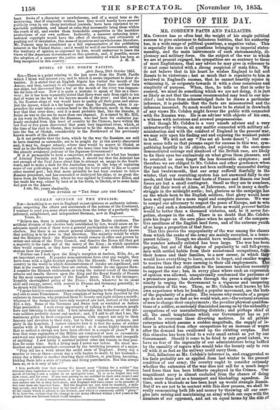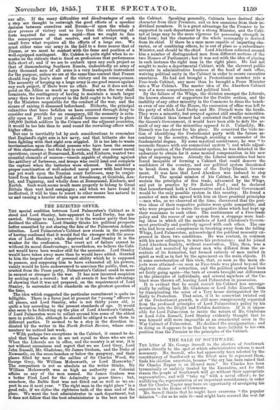TOPICS OF THE DAY.
MR, COBDEN'S FACTS AND FALLACIES.
MB. COBDEN has so often lent the weight of his single politied success to give substance to fallacious bubbles, that his authority has, in a wide range of political questions, a negative value. This is especially the case in all questions belonging to imperial states- manship, and the main instruments of such statesmanship, di- plomacy and military force. On the subject of the war in which we are at present engaged, his sympathies are so eontrary to those of most Englishmen, that any advice he may give in reference Ao it must come tainted with a strong suspicion of male fides. We do not believe that in his heart he.wishes England to fail and Russia to be victorious.; lint so much that ie repulsive to him ie involved in England's success, that he cannot-heartily rejoice in witnessing it, or cotiperate 'towards it with a clear conscience and simplicity of -purpose. When, then, he tells us that in order to succeed, we must do something whieh we are not doing, it is just as likely as not that the course recommended may tend to our mis- chief ; and when from acknowledged facts he draws a particular inference, it is probable that the facts are misconceived and the inference incorrect. So much would have'to be stated in drawback of any views Mr. Cobden might favour the public with connected -with the Russian war. He is an adviser with objects of his oiv-n, a witness with notorious end avowed prepossessions. But though Mr. Cobden is a very unsafe adviser and a Ivry untrustworthy witness, on any matter connected with military ad- -ministration and with the conduct of England in the present war, we.may rely upon his finding out and exposing the weakest points in both. We will not say "Far eat ab 'hoste doceri"; but com- mon sense tells ns that persons eager for success in this war, sym- patbiZing heartily in ifs -objects, and rejoicing in the oncemore demonstrated courage and manhood of the British race, are likely to fix' their eyes too exclusively on what gives them pleasure, and -to overlook or soon forget the less favourable symptoms ; and therefore we are obliged-to Mr. Cobden and other gentlemen where they remind us, that we have not been uniformly successful during the last twelvemonth, that our army suffered fearfully in the winter, that our recruiting system has not answered fully to-our needs, and that beside the vast hosts.of France and Russia our land forces are but a small contingent. Small as they ere in numbers, they did their work at Alma, at Inkerman, and in many a death- at:niggle in the midnight sortie ; but, glorious as the campaign has .on the .whole been to the English soldiers, that glory would haw teen well spared for a more rapid and complete success. We war to compel our adversary-to respect the peace of Europe, not to win glory ; and such a demonstration of force as would prevent battlep. would be better than a thousand victories, and, be it never for- gotten, cheaper in the end. There is no doubt that Mr. Cobden puts his finger on the sore place when he speaks of the compara- tive smallness of the English land force, and of the extreme youth, of so large a proportion of that force. That this proves the unpopularity of the war among the classes from which 'the ranks of the army .are mainly recruited, is a trans- parent fallacy. Though we -should have welcomed more recruits, the number actually enlisted has been large. The war has-been popular, but not of that degree of popularity to call full-grown, men with-settled habits from their accustomed occupations, from -their homes And their .families, to a new career, in which they would have everything to learn, much to forget, and smaller wages to receive than they were earningin,their old employments. The- naticui has raised no objection to the immense taxation necessall to support the war.; has, in everyplace where such an expression of opinion was allowed, unequivocally condemned the partisans.ef a premature peace ; has shown through the press a singular una- nimity in urging the Government to a vigorous and unsparing prosecution of the war. These, as Mr. Cobden well knows by his own experience when he headed a popular movement, are the teats- of the popularity of .a policy. The reasons why recruits of a proper- age do not come as fast. as the could wish,-are—the natural aversion of men to change their employments ; the peculiar physical:qualifica- tions of a soldier, so seriously diminished among us bythe.unhealthy occupations of our manufacturing districts ; and perhaps chief of all, the small temptations which our Government has as yet offered to overcome these diverting motives. In all private enterprises which assume a sudden magnitude, the supply of la- bour is attracted from other occupations by an increase of wages after the demand has -swallowed up the existing surplus. But this stimulus has been tried to a very small extent as .yet by our Government. Should it come to.be tried to any.great extent, we have no fear of the ingenuity-of -our administrators being bodied by the rascality of rogues who would take the-bounty only to run off with it as fast as the railwaycould carrythem. But, fallacious as Mr. Cobden,e inference is, und-exeggerated as his facts probably are as applied from last winter to the present condition of our army, the country ought to consider seriously whether the extension of the war does not call for a much larger land force than has been hitherto employed in the Crimea. Our magnificent navy is almost excluded from the chance of doing much more than act as a transport and blockading squadron. Ill time, such a blockade as has been kept up would strangle Russia. But if we are not to be content with this slow process, we shall be really economizing both life and money by throwing all our ener- gies into raising and maintaining an army which can cope with the numbers-of our opponent, and act on equal terms hy the side of our ally. If the many difficulties and disadvantages of such a step are thought to outweigh the good effects of a speedier decision between ourselves and Russia—if upon the whole a slow process of victory cost us less than the exhausting ef- forts required for one more rapid—then we ought to face the consequences of that resolve, and -not attempt with a small force what requires all the efforts of a large one. We must either raise our army in the held to a force nearer that of France, or we must be content with the fame and position of a well-equipped contingent. Mr. Cobden is quite right when he-re- marks on the ridicule that is fixed on-professions that performance falls short of; and if we are to embark upon any such project as that of dismembering Southern :Russia, undoubtedly an army of forty thousand men of all arms is a very inadequate instrument for the purpose, Artless we are at the same time content that France should reap the lion-'s share of the victory and its consequences. The necessity of 'keeping up a large army is one good reason against any such project, if there were no other. But as it does not de- pend on the Allies so much' as upon Russia when the war shall terminate, the contingency of having to maintain a much larger army than we have at present in the Aeld.oeght to -be fairly faced by the Ministers responsible for ;the conduct of the war, and the Means of raising it dismissed beforehand. Hitherto, the principal calamities that have befallen us have occurred through delay to consider and provide for an emergency, till the necessity is aotta ally open us. Tf next year it should 'become necessary to place 100,000 British soldiers in the Crimea and the adjacent countries, it would be too late then to aend round the recruiting-officer with higher offers. But one is inevitably led by Bud' considerations to remember that England's right arm is her navy, and that hitherto she has been fighting with that right arm.crippled. It is too late towaste incrimination upon the official. persons who have been the causes of this obstruction; but the fact is certain, that our recent naval operations, except at Bomarsund, Kertch, and Einburu, wanted two essential elements of success—vessels capable of atanding nab* the artillery of fortresses, and troops who could land and complete the capture when the batteries were silenced. The mischief a proper combination of well-selected naval power with land troops can yet work upon the Russian coast fortresses, may be conjec- tured from the business half-done at Sw,eaboarg„a.t Genitchi, 4rn- bat, and Taganrog, and wholly .clene at J3omarauud, ICinhurn, and Kertch. Such work seems much mere properly to belong to Great Britain than vast land campaigns ; and when we have found it ineffectual, it will be time to mart to other means less natural to 118 and causing a heavier strain upon our resources,



























 Previous page
Previous page